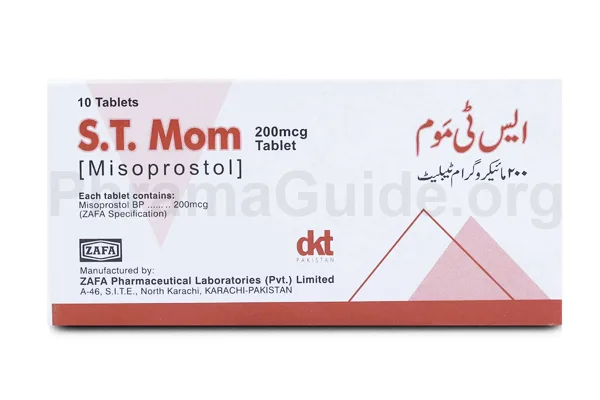ST Mom is a medication commonly used to prevent stomach ulcers in individuals taking nonsteroidal anti-inflammatory drugs (NSAIDs) like ibuprofen or aspirin. It is also used for medical abortion and to induce labor. Like any medication, ST Mom can cause side effects, although not everyone experiences them. Here are some common and less common side effects of ST Mom.
Common Side Effects
- Abdominal pain and cramping: ST Mom can cause moderate to severe abdominal pain and uterine cramping, particularly when used for inducing labor or in medical abortion. These cramps are often similar to strong menstrual cramps.
- Diarrhea: Diarrhea is a common side effect of ST Mom use. It can be mild to severe and might be accompanied by abdominal discomfort.
- Nausea and vomiting: Some individuals might experience nausea and vomiting while taking ST Mom.
- Headache: Headaches can occur as a side effect of ST Mom use.
- Dizziness or lightheadedness: Feeling dizzy or lightheaded might happen in some cases.
- Fatigue: ST Mom can cause tiredness or fatigue in some individuals.
- Chills or fever: Some people might experience mild chills or a slight increase in body temperature.
- Vaginal bleeding: In medical abortion or labor induction, vaginal bleeding is expected and can be heavy. However, if bleeding is excessive or persistent, it should be reported to a healthcare professional immediately.
- Gastrointestinal discomfort: Other gastrointestinal symptoms, such as gas, bloating, or stomach discomfort, might occur.
- Allergic reactions: Rarely, ST Mom can cause allergic reactions, which might manifest as rash, itching, swelling, or difficulty breathing. Seek immediate medical attention if you experience these symptoms.
Less Common Side Effects
- Irregular heartbeat: ST Mom might cause changes in heart rate, resulting in an irregular heartbeat (arrhythmia). This side effect is uncommon but requires medical attention if experienced.
- Urinary tract infections: In rare cases, ST Mom might lead to urinary tract infections (UTIs) characterized by symptoms like frequent urination, pain or burning during urination, and lower abdominal discomfort.
- Joint pain: Some individuals might experience joint pain or discomfort as a less common side effect of ST Mom.
- Difficulty breathing: In rare instances, ST Mom can cause respiratory issues such as shortness of breath or wheezing. If this occurs, seek immediate medical attention.
- Dehydration: Diarrhea, a common side effect of ST Mom, might lead to dehydration, particularly if not managed adequately by replacing lost fluids. Signs of dehydration include excessive thirst, dry mouth, decreased urine output, and dizziness.
- Anemia: Prolonged or heavy bleeding, especially when used for medical abortion, could potentially lead to anemia due to a loss of red blood cells.
- Allergic reactions: Although uncommon, ST Mom can cause severe allergic reactions in some individuals, presenting as skin rash, hives, swelling (especially of the face, lips, and throat), and difficulty breathing. Seek immediate medical help if these symptoms occur.
- Hyperthermia: In rare cases, ST Mom might lead to an increase in body temperature (hyperthermia), which could be a sign of an adverse reaction.

What is ST Mom?
ST Mom is one of the leading brands of Misoprostol, manufactured and marketed by Zafa Pharmaceutical Laboratories (Pvt) Ltd, Pakistan.
ST Mom : Available Formulations and Strengths
Presently, ST Mom is available in Tablet Form with the following strengths.
ST Mom Tablets : 25mcg and 200mcg strengths.
What Are The Possible Drug Interactions of ST Mom?
- Antacids containing magnesium: Taking ST Mom with magnesium-containing antacids might increase the risk of diarrhea, a common side effect of ST Mom.
- NSAIDs (Nonsteroidal anti-inflammatory drugs): ST Mom is often prescribed alongside NSAIDs to prevent ulcers. While it does not interact directly with NSAIDs, it’s important to note that ST Mom might not completely prevent the risk of NSAID-induced ulcers.
- Anticoagulants (blood thinners): Concurrent use of ST Mom with anticoagulants like warfarin or antiplatelet drugs like aspirin might increase the risk of bleeding due to their combined effect on blood clotting.
- Oxytocin and other uterine stimulants: When used together, ST Mom and medications that stimulate uterine contractions (such as oxytocin) can enhance the effects on the uterus, potentially leading to excessive contractions.
- Mifepristone: When used for medical abortion, ST Mom is often used in combination with mifepristone. This combination is designed to terminate pregnancy and should only be used under close medical supervision.
- Proton pump inhibitors (PPIs) and H2 blockers: These medications used to reduce stomach acid might decrease the effectiveness of ST Mom in preventing NSAID-induced ulcers.
- Corticosteroids: Long-term use of corticosteroids alongside ST Mom might increase the risk of gastrointestinal side effects.
- Lithium: ST Mom might reduce the blood levels of lithium, potentially reducing its effectiveness. Monitoring of lithium levels may be necessary.
- Sulfonylureas (used to treat diabetes): ST Mom may increase the effects of sulfonylureas, leading to lower blood sugar levels. Close monitoring of blood sugar is recommended when used together.
- Cyclosporine and tacrolimus: These medications used to prevent organ rejection in transplant patients might have their levels increased when taken with ST Mom, potentially leading to toxic effects.

Leave A Comment